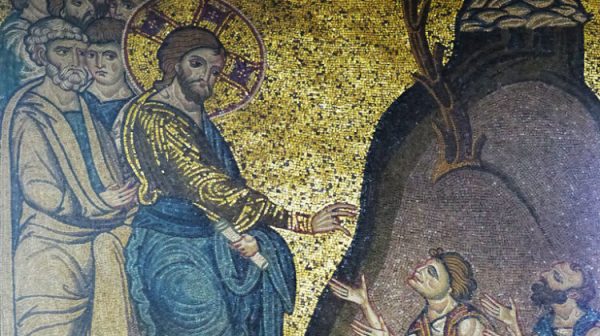After several weeks of almost unprecedented temptations of both soul and body here at the monastery, we have just heard these beautiful and inspiring words from St. Paul in today’s Epistle lesson: “For whatsoever things were written aforetime were written for our learning, that we through patience and comfort of the scriptures might have hope” (Romans 15:4). And in today’s Gospel reading we are being given an earnest of this comfort and this hope, as we behold Christ healing the physical afflictions of the blind men and the spiritual afflictions of the demoniac.
Truly, my brothers and sisters, the Gospel reveals to us today the great truth that every tragedy, every suffering, every affliction which our fallen humanity experiences in this life (whether in body or in spirit) can not only be healed by grace of our all-merciful and all-powerful God, but can even be transfigured into the very source of absolutely unparalleled and incomprehensible grace — and not only for the one suffering, but also through them for all mankind in all ages. For it was through their very suffering that the men in today’s Gospel passage came to know the mercy and love of our Lord Jesus Christ, and it is through their experience that even we poor sinners — two thousand years later and half a world apart — are today, in the midst of our own struggles and temptations, being given the “patience and comfort of the Scriptures” that we too “might have hope.”
In the eyes of the secular world around us, there is nothing more to be deplored and rejected than suffering. The utopian visions of modernity spur us on in our attempts to build a world totally free from suffering, a world in which each of us can please ourselves in whatever way we most like — so long as we do no harm to others. Our politicians declare to us that such a world is within our grasp, and our philosophers even declare to us that to seek such a world is the very quintessence of goodness and morality. In the eyes of the secular age in which we live, to speak of the value and the meaning of suffering is nothing short of a moral monstrosity.
The demons have done their work well. Like the demoniac in today’s Gospel, they have stopped our mouths from speaking the truth; like the blind men in today’s Gospel, they have closed our eyes to seeing the truth. But St. Paul, whose blind eyes were opened by the grace of our Lord Jesus Christ, declares to us the truth through a mouth opened by the Holy Spirit of God:
But we see Jesus, who was made a little lower than the angels for the suffering of death, crowned with glory and honour; that He by the grace of God should taste death for every man. For it became Him, for Whom are all things, and by Whom are all things, in bringing many sons unto glory, to make the captain of their salvation perfect through sufferings. (Hebrews 2:9-10)
And in another place:
For I reckon that the sufferings of this present time are not worthy to be compared with the glory which shall be revealed in us. (Romans 8:18)
And yet again:
But we have this treasure in earthen vessels, that the excellency of the power may be of God, and not of us. We are troubled on every side, yet not distressed; we are perplexed, but not in despair; persecuted, but not forsaken; cast down, but not destroyed; always bearing about in the body the dying of the Lord Jesus, that the life also of Jesus might be made manifest in our body. For we which live are always delivered unto death for Jesus’ sake, that the life also of Jesus might be made manifest in our mortal flesh…. For which cause we faint not; but though our outward man perish, yet the inward man is renewed day by day. For our light affliction, which is but for a moment, worketh for us a far more exceeding and eternal weight of glory; while we look not at the things which are seen, but at the things which are not seen: for the things which are seen are temporal; but the things which are not seen are eternal. (2 Cor. 4:7-11, 16-18)
May God grant each one of us to receive much patience and comfort and hope from these beautiful and holy words. For although all suffering is a tragedy which God never desired, a horrific manifestation of the fallenness of the world which we have disfigured through our sins, nevertheless this is not the end of the story. Because Christ our God has come to this earth, taken on flesh, and by enduring the Cross and rising again from the dead He has filled all things — even suffering, even death — with Himself.
Perhaps we do not understand why it must be this way. Perhaps we ask ourselves why God could not choose some other way to save us, some other way to heal us. Well, St. Isaac the Syrian gives us a clear and simple answer: God could have chosen some other way to save us. But He chose the way of the Cross precisely because no other way could so perfectly reveal to us the greatness of His love. As our Lord Himself said: “Greater love hath no man than this, that a man lay down his life for his friends” (John 15:13).
There exists no possible act of love greater than for our perfect and all-blameless Lord to willingly take upon Himself the most vile of our sins and the most terrible abuses of our God-given freedom, even to the point of His own death on the Cross. And there exists no greater proof of the power of His mercy than for Him to take nothing less than His own murder at the hands of His children and His own betrayal at the hands of His closest friends, and to transform it into the very act that opened Heaven to those same sinners and bestowed immortality and deification on race of fallen man.
He did that for us — for you and for me and for every man and woman who has ever walked upon this sinful earth — two thousands years ago outside the gates of the Holy City of Jerusalem. And He continues to do it, again and again, at every hour and every minute of every single day of our lives. The greatness of His love is freely given to us over and over again — not only in spite of, but even through, the very worst of our sins and failures and mistakes. The Lord freely suffers all things from us, and turns all of it — without exception — to our eternal and unending benefit and good.
And so there is no greater way for us in our own turn to be united to Christ, to be united to His love, than by freely embracing our own suffering — no matter how great or how small — with gratitude, and with faith, and with love, for the sake of Christ and for the sake of one another. If we are willing to do this, then even in this life it will not take long for us to see the good which the Lord will undoubtedly bring from it. We need look no further back than a few short decades ago to see how even the most terrible sufferings human beings could conceive to inflict upon one another — from the Gulags to the demonic prisons at Pitești — so often produced elders and saints of such unfathomable holiness and love as sinners such as us scarcely dream could exist, whose hearts were filled to overflowing with endless love and compassion and prayer for the very people who were inflicting upon them the worst possible tortures and most unimaginable horrors, day after day after day.
As Fr. Seraphim Rose once said:
When conversion takes place, the process of revelation occurs in a very simple way—a person is in need, he suffers, and then somehow the other world opens up. The more you are in suffering and difficulties and are ‘desperate’ for God, the more He is going to come to your aid, reveal Who He is and show you the way out.… Why is the truth, it would seem, revealed to some and not to others? Is there a special organ for receiving revelation from God? Yes, though usually we close it and do not let it open up: God’s revelation is given to something called a loving heart. (God’s Revelation to the Human Heart)
My brothers and sisters, no matter what the world may promise, the truth is that there is no way to avoid suffering in this life. Our only choice is whether to fill that suffering with emptiness and despair, or with meaning and with love. Our only choice is whether or not we will seek after the Lord Jesus Christ in our sufferings — just as the blind men in today’s Gospel sought after Him, though their eyes could not see Him — or whether we will allow this great and holy opportunity, the opportunity to encounter the living God Himself, to pass us by.
May God grant us to make our choice wisely. For truly, even to this day the Lord continues to go “about all the cities and villages, teaching… and preaching the gospel of the kingdom, and healing every sickness and every disease among the people.” Let us not allow Him to pass us by, but rather let us cry out like the blind men (especially if we too are blind in the eyes of our hearts): “O Son of God, have mercy on us.” And imitating their faith — the faith which brought to them and to us both healing and salvation — let us in no wise neglect also to cry out: “Glory to God for all things.” Amen.

















